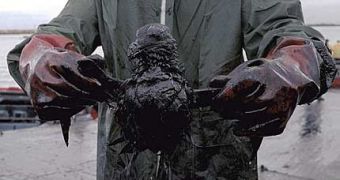Early this month, a storm raging in the waters of the Black Sea led to a catastrophic oil spill, as the oil tanker seeking refuge wrecked in the Kerch Strait, and leaked over 2,000 tons of petrol. As a result of the havoc, the WWF inspectors evaluating the situation came to the conclusion that it would take at least a decade until the marine environment recovers from the disaster.
The fishing industry has been severely affected by the situation, as the caught fish is not safe for consumption. Also about eleven endangered bird species populate the general area of the Kerch Strait, amongst which the Dalmatian pelican and great black-headed gull, and other migrating species that usually winter in the area of the Strait.
During the containment phase and clean-up operations of the oil spot, the WWF crew managed to partially save some of the affected birds. Nevertheless, these saved birds only represent a small part of the percentage of birds affected. Also in the clean-up, two dolphins have been found washed up ashore and rescued, but they show small probability of recovering. They are part of the bottlenose species of dolphins, one of the two species that populate the Black Sea.
According to Igor Chestin, the CEO of WWF-Russia, the consequences of such a disaster are practically impossible to be completely eliminated; however, they could be avoided through immediate changes in the policy of the oil transportation system.
The WWF and several other environmental NGO's have already forwarded a list of recommendations to the Russian government, that involve training local volunteers to participate in eventual future cleaning operations, the restriction or stopping of the transport of oil exports through river-sea corridors and the interdiction of using river vessels for marine operations, and the development of a clear legislation for oil spill in Russia, similar to that adopted after the Exxon Valdez disaster in 1989, in the Alaska peninsula.
There is also evidence that the Russian government is preparing a law based on the principle of 'the polluter pays', to ensure such events will guarantee the security of the environment. Until now, the law project has not been approved by the Russian Lower House of Parliament.
The approval of this draft law could solve most of the problems related to the risk of future oil spills, thus holding the oil transport companies completely responsible.

 14 DAY TRIAL //
14 DAY TRIAL //